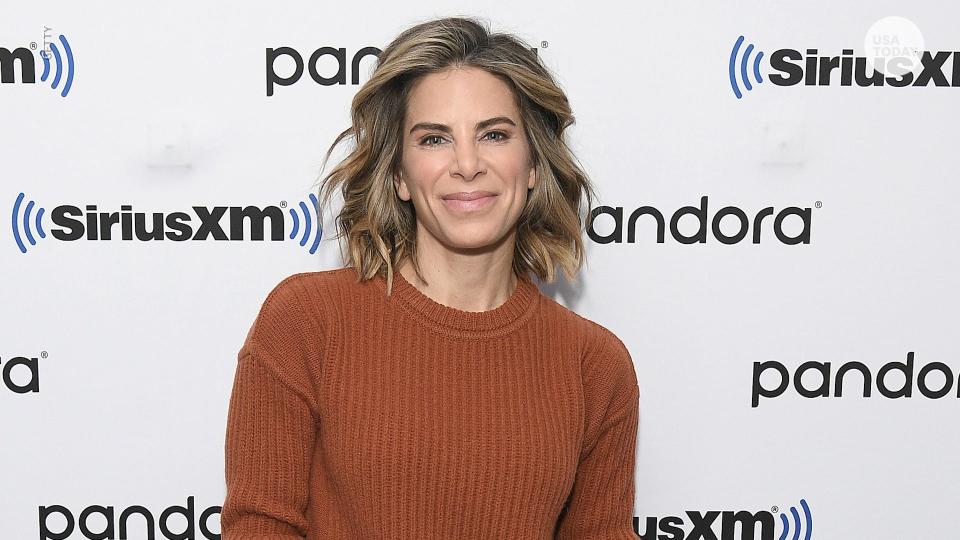Jillian Michaels 'would love to leave weight loss drugs behind' in 2024. Here's why.
- Oops!Something went wrong.Please try again later.
Weight less drugs like Ozempic popped up everywhere in 2023. But health and wellness expert Jillian Michaels would like them (mostly) gone for good in 2024.
"I would love to leave weight loss drugs behind except for life-or-death interventions," the former "The Biggest Loser" trainer told USA TODAY in an interview ahead of the new year. It comes as big-shot celebrities like Oprah have embraced the practice despite its controversies.
Michaels is encouraging people get back to basics in 2024 and avoid falling prey to potentially problematic trends. "The problem with trends is that they never pan out," she says. "And they take people so far off the path to a real solution with confusion and backsliding."

Jillian Michaels has 'zero judgment' for those who use weight loss drugs
Drugs such as Ozempic, Wegovy and Mounjaro can help someone lose 15% to 20% of their body weight – as much as 60 pounds for someone who started at 300.
Weight loss medications work by sending signals to the appetite center of the brain to reduce hunger and increase fullness, according to Dr. Deborah Horn, an assistant professor of surgery at the McGovern Medical School at UTHealth Houston. Once a person stops taking the drug, that effect is gone, paving the way for some people to regain what they lost if they don't adjust their diet and exercise patterns.
It's not clear whether the newer generation of weight loss drugs, which suppress appetite, will provide different long-term results than other weight loss approaches.
In the longest study, lasting 68 weeks – about 16 months – weight loss plateaued and started to climb again by the end, suggesting people's bodies had acclimated to the drugs. Side effects from Ozempic run the gamut – from losing too much weight, to gaining it all back, to plateauing. Not to mention the nausea, diarrhea and other gastrointestinal issues.
Before taking a weight loss drug, Michaels suggests looking into supplements like berberine and yerba mate tea as alternatives. She also recommends checking in with a doctor before supplementing one's diet. "I have no problem with people taking these formulas," she says. "But somebody just needs to make sure that they're doing your bloodwork regularly, and that your hormones are actually balanced in an optimal way."
Still, Michaels holds "zero judgment" for those who use these drugs as part of their weight loss arsenal. She "just would like people to try every other way forward first."
'There's no secret' to weight loss
Some of those ways forward: eating less (what weight loss drugs can help with), avoiding added sugars and moving more. Of course, it's easier said than done, and will not yield the same results for everyone.
"We don't want people eating so little that they're not getting enough nutrients," Michaels says. "But what these drugs have shown is that it doesn't matter your age, menopause, no menopause, this that the other, if you are eating a bit less food, and moving a bit more often, you can absolutely manage your weight."
Moving more "doesn't mean go crazy at 50 in a way you never have," she adds. "It means obviously work to your current fitness level. But there are no types of fitness that are out of bounds as you age – quite the opposite." Think high intensity interval training and strength training. Intermittent fasting can also help with weight loss.
Losing weight grows harder as one ages. A 30-year-old might burn 2,000 calories a day, for example, compared to a 50-year-old burning 1,300 calories. If that's the case, you need to exercise more and avoid eating everything you did in your 30s. Her 13-year-old can eat her entire refrigerator, she jokes, but she can only eat the rail on the right door.
"That is the science of it," she says. "There's no secret to it." This diligence will come in handy once women hit menopause and undergo hormone changes: "There is no like, 'Oh, I hit menopause and now it's a slow descent into decrepitude,'" Michaels says "It's just not true. Jane Fonda looked amazing – she still does!"
She knows that curbing one's diet of added sugars isn't ideal. But in her opinion, it might be the alternative: "Does it suck? Yes, but it's a lot better than taking a drug that's going to have crazy side effects that you can never get off of, and you'll eventually plateau on."
Contributing: Karen Weintraub and Katie Camero
This article originally appeared on USA TODAY: Jillian Michaels on Ozempic, weight loss and menopause

